Business Law Report: Legal Systems, Business Funding, and Case Studies
VerifiedAdded on 2023/01/11
|12
|3735
|99
Report
AI Summary
This report on business law delves into the intricacies of the UK legal system, exploring its nature, strengths, and weaknesses. It examines key legislation, regulations, and standards that businesses must adhere to for successful operation, including contract law, employment law, and the law of torts. The report provides a detailed analysis of different types of business organizations, such as sole traders, partnerships, and limited companies, alongside a critical evaluation of how these organizations are funded. Furthermore, it includes case studies to illustrate the practical application of business law principles and concludes with a comprehensive overview of the subject matter. This report aims to enhance understanding of business law and its implications for businesses.
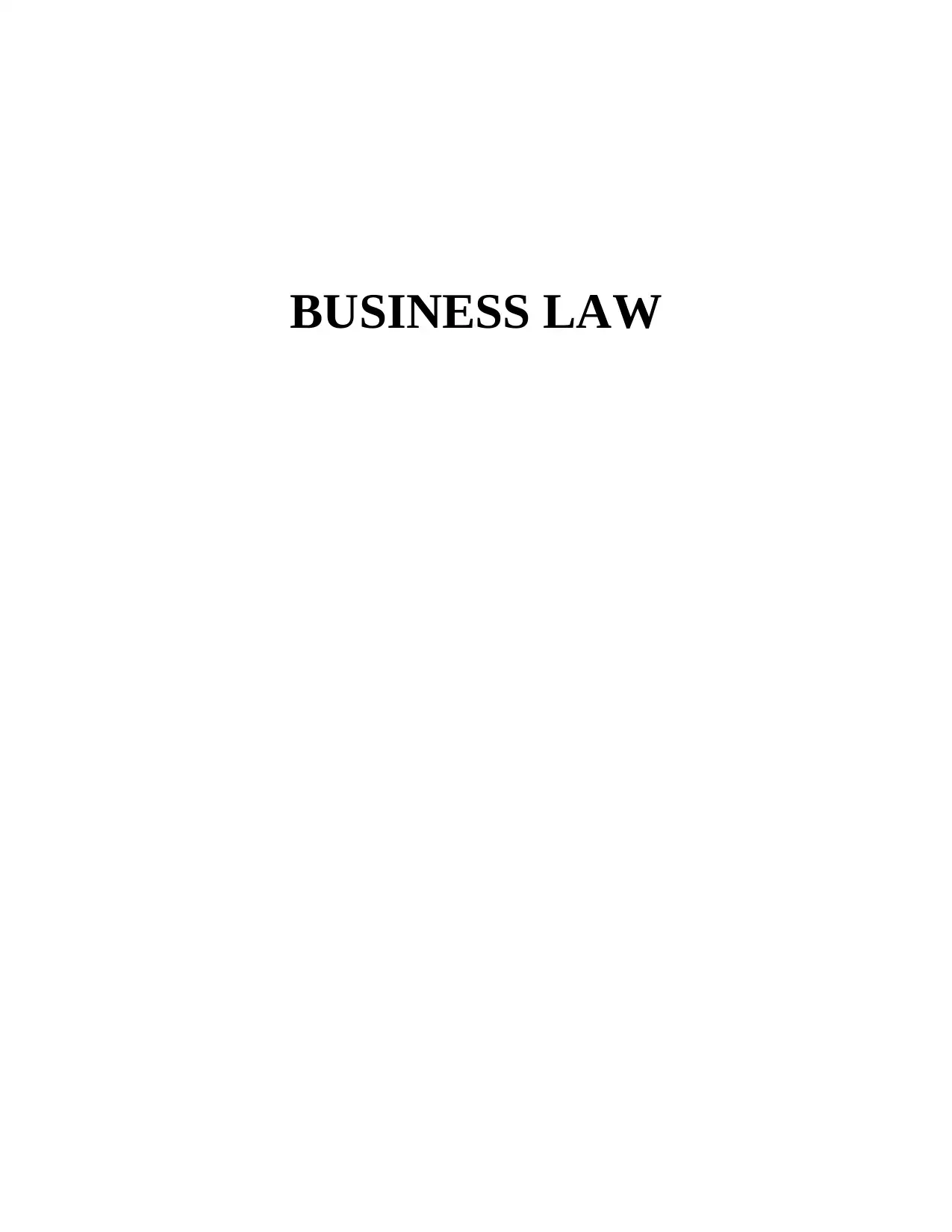
BUSINESS LAW
Secure Best Marks with AI Grader
Need help grading? Try our AI Grader for instant feedback on your assignments.
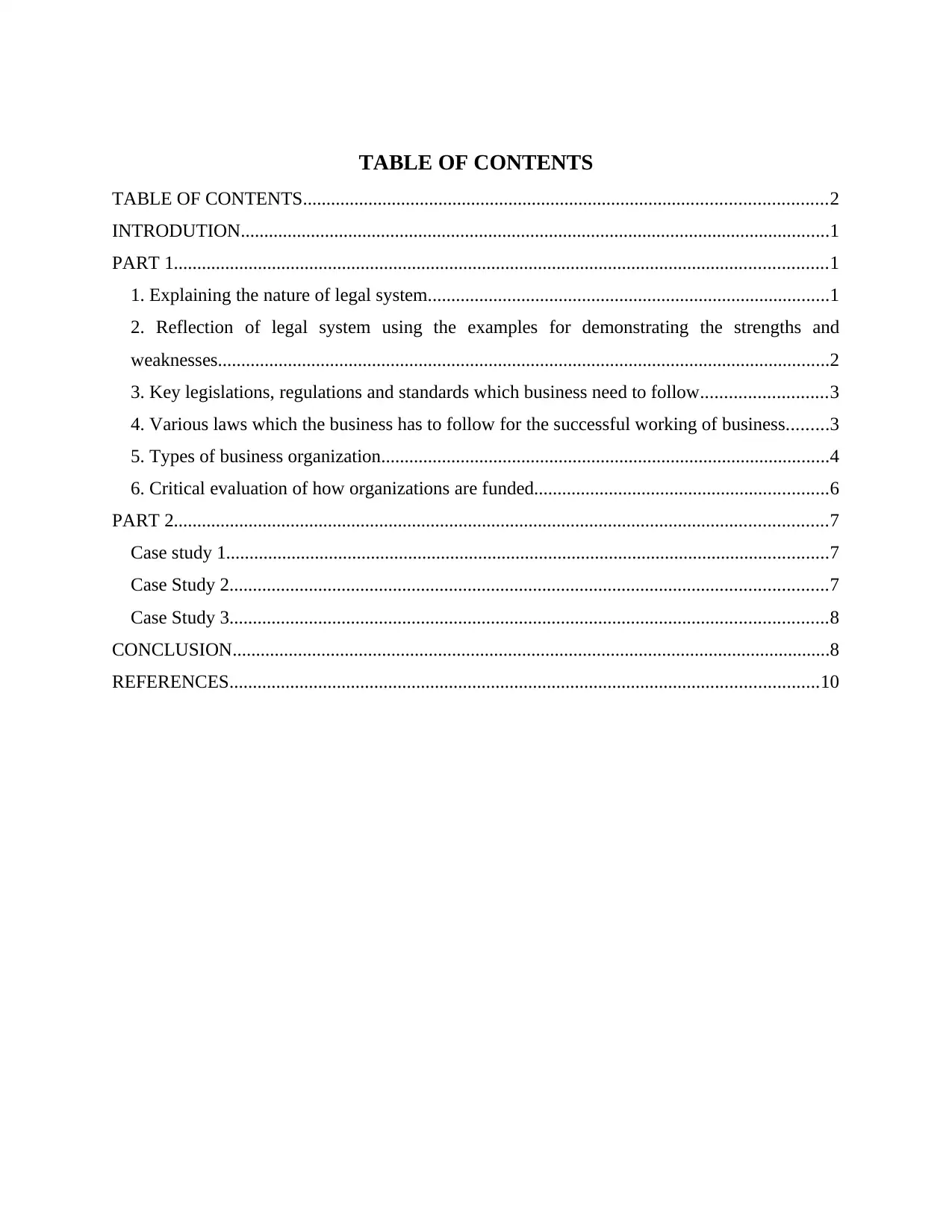
TABLE OF CONTENTS
TABLE OF CONTENTS................................................................................................................2
INTRODUTION..............................................................................................................................1
PART 1............................................................................................................................................1
1. Explaining the nature of legal system......................................................................................1
2. Reflection of legal system using the examples for demonstrating the strengths and
weaknesses...................................................................................................................................2
3. Key legislations, regulations and standards which business need to follow...........................3
4. Various laws which the business has to follow for the successful working of business.........3
5. Types of business organization................................................................................................4
6. Critical evaluation of how organizations are funded...............................................................6
PART 2............................................................................................................................................7
Case study 1.................................................................................................................................7
Case Study 2................................................................................................................................7
Case Study 3................................................................................................................................8
CONCLUSION................................................................................................................................8
REFERENCES..............................................................................................................................10
TABLE OF CONTENTS................................................................................................................2
INTRODUTION..............................................................................................................................1
PART 1............................................................................................................................................1
1. Explaining the nature of legal system......................................................................................1
2. Reflection of legal system using the examples for demonstrating the strengths and
weaknesses...................................................................................................................................2
3. Key legislations, regulations and standards which business need to follow...........................3
4. Various laws which the business has to follow for the successful working of business.........3
5. Types of business organization................................................................................................4
6. Critical evaluation of how organizations are funded...............................................................6
PART 2............................................................................................................................................7
Case study 1.................................................................................................................................7
Case Study 2................................................................................................................................7
Case Study 3................................................................................................................................8
CONCLUSION................................................................................................................................8
REFERENCES..............................................................................................................................10
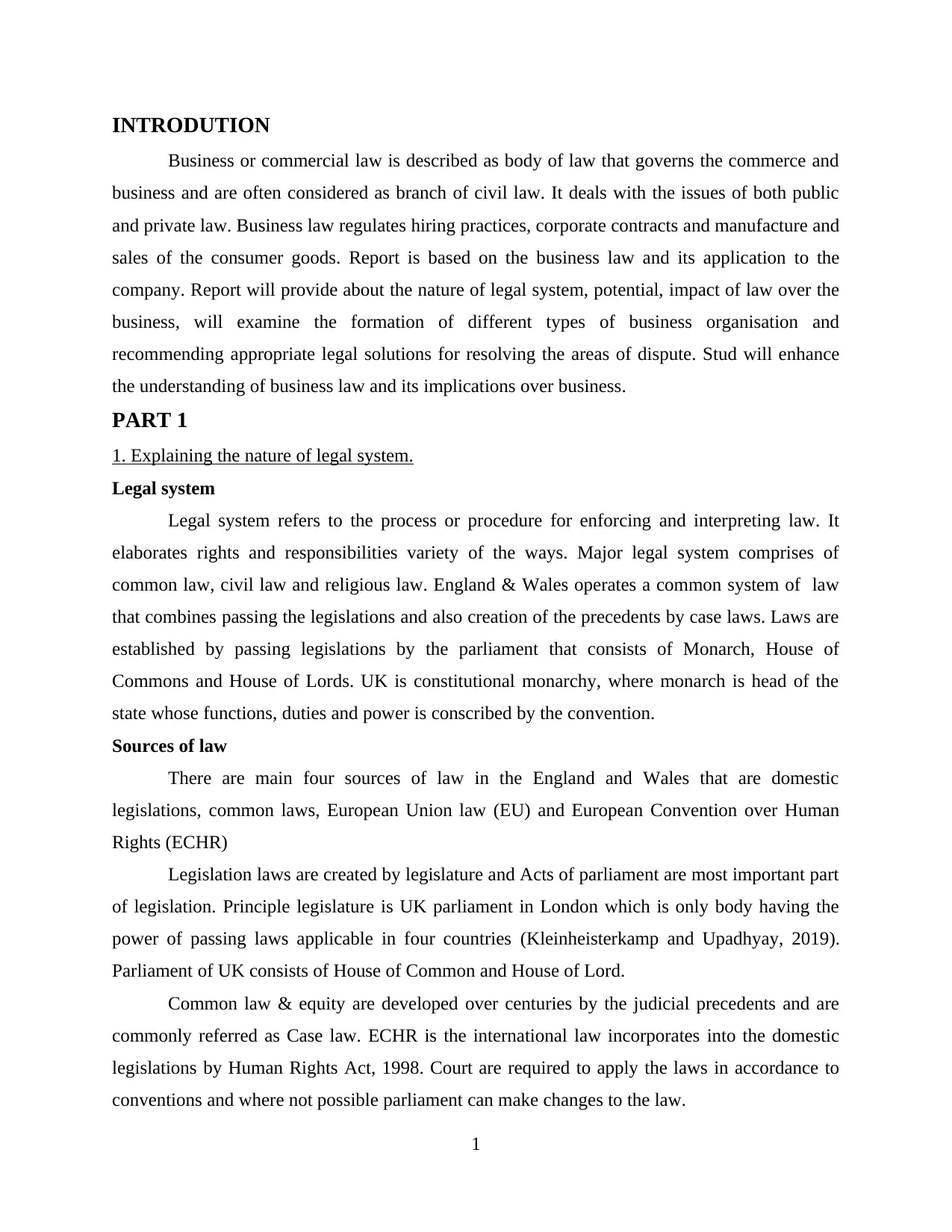
INTRODUTION
Business or commercial law is described as body of law that governs the commerce and
business and are often considered as branch of civil law. It deals with the issues of both public
and private law. Business law regulates hiring practices, corporate contracts and manufacture and
sales of the consumer goods. Report is based on the business law and its application to the
company. Report will provide about the nature of legal system, potential, impact of law over the
business, will examine the formation of different types of business organisation and
recommending appropriate legal solutions for resolving the areas of dispute. Stud will enhance
the understanding of business law and its implications over business.
PART 1
1. Explaining the nature of legal system.
Legal system
Legal system refers to the process or procedure for enforcing and interpreting law. It
elaborates rights and responsibilities variety of the ways. Major legal system comprises of
common law, civil law and religious law. England & Wales operates a common system of law
that combines passing the legislations and also creation of the precedents by case laws. Laws are
established by passing legislations by the parliament that consists of Monarch, House of
Commons and House of Lords. UK is constitutional monarchy, where monarch is head of the
state whose functions, duties and power is conscribed by the convention.
Sources of law
There are main four sources of law in the England and Wales that are domestic
legislations, common laws, European Union law (EU) and European Convention over Human
Rights (ECHR)
Legislation laws are created by legislature and Acts of parliament are most important part
of legislation. Principle legislature is UK parliament in London which is only body having the
power of passing laws applicable in four countries (Kleinheisterkamp and Upadhyay, 2019).
Parliament of UK consists of House of Common and House of Lord.
Common law & equity are developed over centuries by the judicial precedents and are
commonly referred as Case law. ECHR is the international law incorporates into the domestic
legislations by Human Rights Act, 1998. Court are required to apply the laws in accordance to
conventions and where not possible parliament can make changes to the law.
1
Business or commercial law is described as body of law that governs the commerce and
business and are often considered as branch of civil law. It deals with the issues of both public
and private law. Business law regulates hiring practices, corporate contracts and manufacture and
sales of the consumer goods. Report is based on the business law and its application to the
company. Report will provide about the nature of legal system, potential, impact of law over the
business, will examine the formation of different types of business organisation and
recommending appropriate legal solutions for resolving the areas of dispute. Stud will enhance
the understanding of business law and its implications over business.
PART 1
1. Explaining the nature of legal system.
Legal system
Legal system refers to the process or procedure for enforcing and interpreting law. It
elaborates rights and responsibilities variety of the ways. Major legal system comprises of
common law, civil law and religious law. England & Wales operates a common system of law
that combines passing the legislations and also creation of the precedents by case laws. Laws are
established by passing legislations by the parliament that consists of Monarch, House of
Commons and House of Lords. UK is constitutional monarchy, where monarch is head of the
state whose functions, duties and power is conscribed by the convention.
Sources of law
There are main four sources of law in the England and Wales that are domestic
legislations, common laws, European Union law (EU) and European Convention over Human
Rights (ECHR)
Legislation laws are created by legislature and Acts of parliament are most important part
of legislation. Principle legislature is UK parliament in London which is only body having the
power of passing laws applicable in four countries (Kleinheisterkamp and Upadhyay, 2019).
Parliament of UK consists of House of Common and House of Lord.
Common law & equity are developed over centuries by the judicial precedents and are
commonly referred as Case law. ECHR is the international law incorporates into the domestic
legislations by Human Rights Act, 1998. Court are required to apply the laws in accordance to
conventions and where not possible parliament can make changes to the law.
1
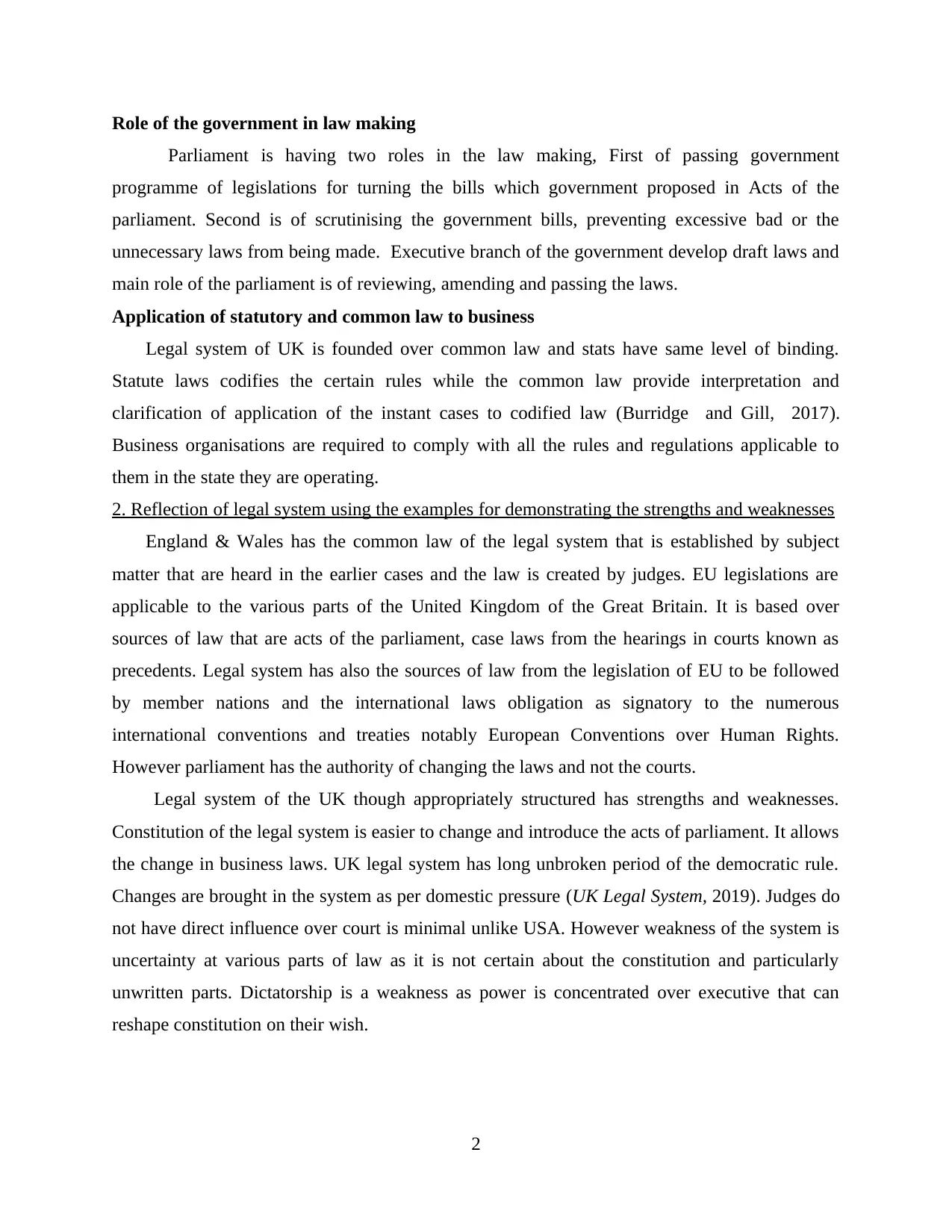
Role of the government in law making
Parliament is having two roles in the law making, First of passing government
programme of legislations for turning the bills which government proposed in Acts of the
parliament. Second is of scrutinising the government bills, preventing excessive bad or the
unnecessary laws from being made. Executive branch of the government develop draft laws and
main role of the parliament is of reviewing, amending and passing the laws.
Application of statutory and common law to business
Legal system of UK is founded over common law and stats have same level of binding.
Statute laws codifies the certain rules while the common law provide interpretation and
clarification of application of the instant cases to codified law (Burridge and Gill, 2017).
Business organisations are required to comply with all the rules and regulations applicable to
them in the state they are operating.
2. Reflection of legal system using the examples for demonstrating the strengths and weaknesses
England & Wales has the common law of the legal system that is established by subject
matter that are heard in the earlier cases and the law is created by judges. EU legislations are
applicable to the various parts of the United Kingdom of the Great Britain. It is based over
sources of law that are acts of the parliament, case laws from the hearings in courts known as
precedents. Legal system has also the sources of law from the legislation of EU to be followed
by member nations and the international laws obligation as signatory to the numerous
international conventions and treaties notably European Conventions over Human Rights.
However parliament has the authority of changing the laws and not the courts.
Legal system of the UK though appropriately structured has strengths and weaknesses.
Constitution of the legal system is easier to change and introduce the acts of parliament. It allows
the change in business laws. UK legal system has long unbroken period of the democratic rule.
Changes are brought in the system as per domestic pressure (UK Legal System, 2019). Judges do
not have direct influence over court is minimal unlike USA. However weakness of the system is
uncertainty at various parts of law as it is not certain about the constitution and particularly
unwritten parts. Dictatorship is a weakness as power is concentrated over executive that can
reshape constitution on their wish.
2
Parliament is having two roles in the law making, First of passing government
programme of legislations for turning the bills which government proposed in Acts of the
parliament. Second is of scrutinising the government bills, preventing excessive bad or the
unnecessary laws from being made. Executive branch of the government develop draft laws and
main role of the parliament is of reviewing, amending and passing the laws.
Application of statutory and common law to business
Legal system of UK is founded over common law and stats have same level of binding.
Statute laws codifies the certain rules while the common law provide interpretation and
clarification of application of the instant cases to codified law (Burridge and Gill, 2017).
Business organisations are required to comply with all the rules and regulations applicable to
them in the state they are operating.
2. Reflection of legal system using the examples for demonstrating the strengths and weaknesses
England & Wales has the common law of the legal system that is established by subject
matter that are heard in the earlier cases and the law is created by judges. EU legislations are
applicable to the various parts of the United Kingdom of the Great Britain. It is based over
sources of law that are acts of the parliament, case laws from the hearings in courts known as
precedents. Legal system has also the sources of law from the legislation of EU to be followed
by member nations and the international laws obligation as signatory to the numerous
international conventions and treaties notably European Conventions over Human Rights.
However parliament has the authority of changing the laws and not the courts.
Legal system of the UK though appropriately structured has strengths and weaknesses.
Constitution of the legal system is easier to change and introduce the acts of parliament. It allows
the change in business laws. UK legal system has long unbroken period of the democratic rule.
Changes are brought in the system as per domestic pressure (UK Legal System, 2019). Judges do
not have direct influence over court is minimal unlike USA. However weakness of the system is
uncertainty at various parts of law as it is not certain about the constitution and particularly
unwritten parts. Dictatorship is a weakness as power is concentrated over executive that can
reshape constitution on their wish.
2
Secure Best Marks with AI Grader
Need help grading? Try our AI Grader for instant feedback on your assignments.
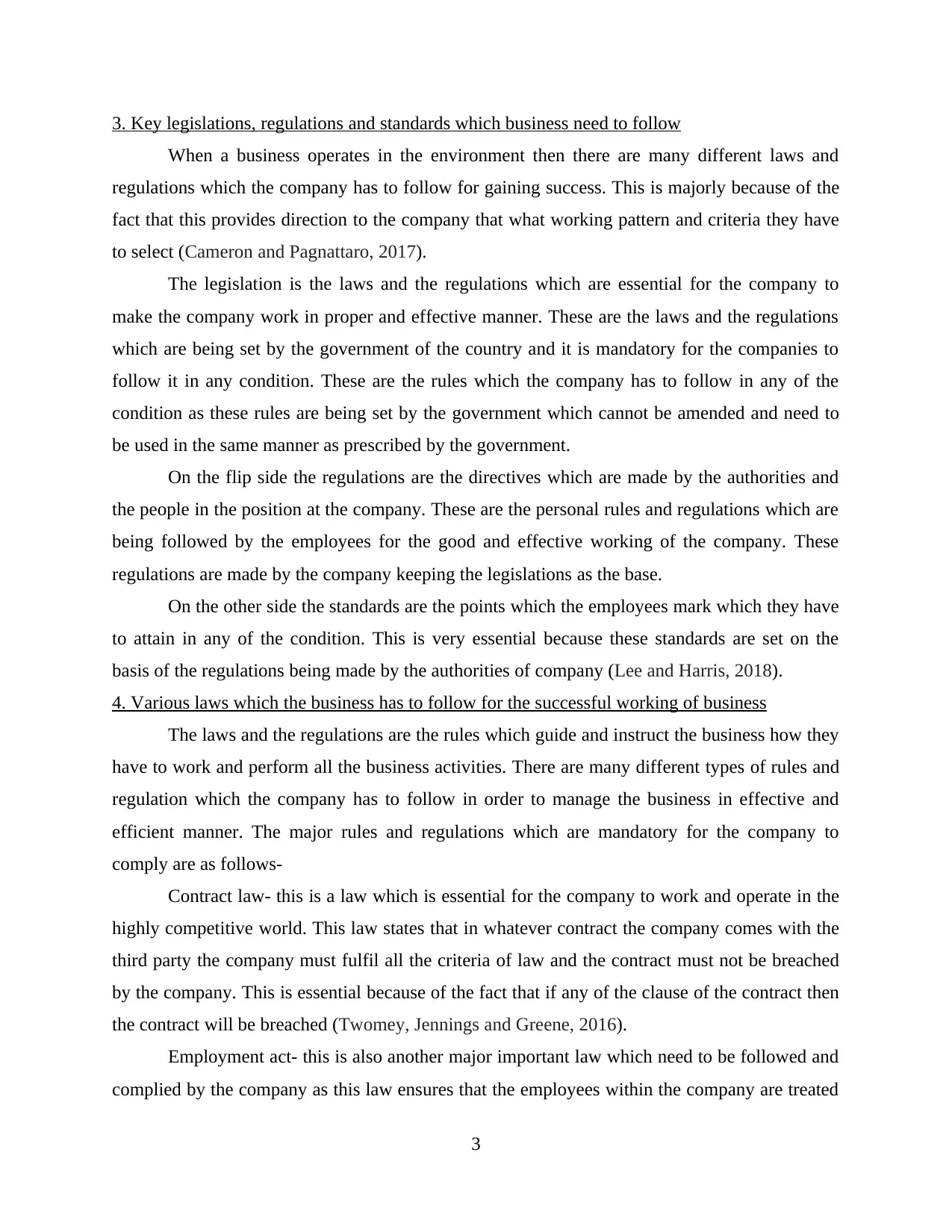
3. Key legislations, regulations and standards which business need to follow
When a business operates in the environment then there are many different laws and
regulations which the company has to follow for gaining success. This is majorly because of the
fact that this provides direction to the company that what working pattern and criteria they have
to select (Cameron and Pagnattaro, 2017).
The legislation is the laws and the regulations which are essential for the company to
make the company work in proper and effective manner. These are the laws and the regulations
which are being set by the government of the country and it is mandatory for the companies to
follow it in any condition. These are the rules which the company has to follow in any of the
condition as these rules are being set by the government which cannot be amended and need to
be used in the same manner as prescribed by the government.
On the flip side the regulations are the directives which are made by the authorities and
the people in the position at the company. These are the personal rules and regulations which are
being followed by the employees for the good and effective working of the company. These
regulations are made by the company keeping the legislations as the base.
On the other side the standards are the points which the employees mark which they have
to attain in any of the condition. This is very essential because these standards are set on the
basis of the regulations being made by the authorities of company (Lee and Harris, 2018).
4. Various laws which the business has to follow for the successful working of business
The laws and the regulations are the rules which guide and instruct the business how they
have to work and perform all the business activities. There are many different types of rules and
regulation which the company has to follow in order to manage the business in effective and
efficient manner. The major rules and regulations which are mandatory for the company to
comply are as follows-
Contract law- this is a law which is essential for the company to work and operate in the
highly competitive world. This law states that in whatever contract the company comes with the
third party the company must fulfil all the criteria of law and the contract must not be breached
by the company. This is essential because of the fact that if any of the clause of the contract then
the contract will be breached (Twomey, Jennings and Greene, 2016).
Employment act- this is also another major important law which need to be followed and
complied by the company as this law ensures that the employees within the company are treated
3
When a business operates in the environment then there are many different laws and
regulations which the company has to follow for gaining success. This is majorly because of the
fact that this provides direction to the company that what working pattern and criteria they have
to select (Cameron and Pagnattaro, 2017).
The legislation is the laws and the regulations which are essential for the company to
make the company work in proper and effective manner. These are the laws and the regulations
which are being set by the government of the country and it is mandatory for the companies to
follow it in any condition. These are the rules which the company has to follow in any of the
condition as these rules are being set by the government which cannot be amended and need to
be used in the same manner as prescribed by the government.
On the flip side the regulations are the directives which are made by the authorities and
the people in the position at the company. These are the personal rules and regulations which are
being followed by the employees for the good and effective working of the company. These
regulations are made by the company keeping the legislations as the base.
On the other side the standards are the points which the employees mark which they have
to attain in any of the condition. This is very essential because these standards are set on the
basis of the regulations being made by the authorities of company (Lee and Harris, 2018).
4. Various laws which the business has to follow for the successful working of business
The laws and the regulations are the rules which guide and instruct the business how they
have to work and perform all the business activities. There are many different types of rules and
regulation which the company has to follow in order to manage the business in effective and
efficient manner. The major rules and regulations which are mandatory for the company to
comply are as follows-
Contract law- this is a law which is essential for the company to work and operate in the
highly competitive world. This law states that in whatever contract the company comes with the
third party the company must fulfil all the criteria of law and the contract must not be breached
by the company. This is essential because of the fact that if any of the clause of the contract then
the contract will be breached (Twomey, Jennings and Greene, 2016).
Employment act- this is also another major important law which need to be followed and
complied by the company as this law ensures that the employees within the company are treated
3
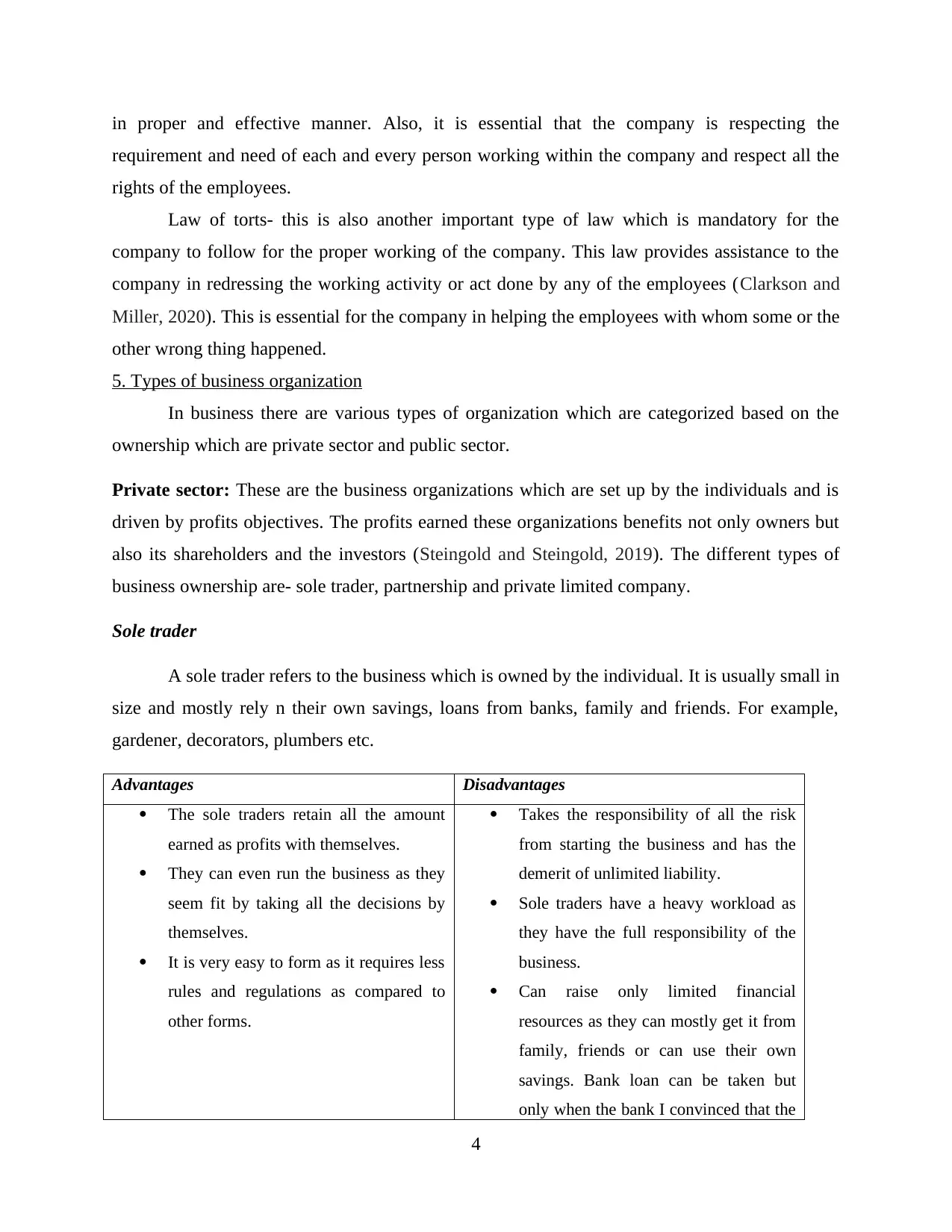
in proper and effective manner. Also, it is essential that the company is respecting the
requirement and need of each and every person working within the company and respect all the
rights of the employees.
Law of torts- this is also another important type of law which is mandatory for the
company to follow for the proper working of the company. This law provides assistance to the
company in redressing the working activity or act done by any of the employees (Clarkson and
Miller, 2020). This is essential for the company in helping the employees with whom some or the
other wrong thing happened.
5. Types of business organization
In business there are various types of organization which are categorized based on the
ownership which are private sector and public sector.
Private sector: These are the business organizations which are set up by the individuals and is
driven by profits objectives. The profits earned these organizations benefits not only owners but
also its shareholders and the investors (Steingold and Steingold, 2019). The different types of
business ownership are- sole trader, partnership and private limited company.
Sole trader
A sole trader refers to the business which is owned by the individual. It is usually small in
size and mostly rely n their own savings, loans from banks, family and friends. For example,
gardener, decorators, plumbers etc.
Advantages Disadvantages
The sole traders retain all the amount
earned as profits with themselves.
They can even run the business as they
seem fit by taking all the decisions by
themselves.
It is very easy to form as it requires less
rules and regulations as compared to
other forms.
Takes the responsibility of all the risk
from starting the business and has the
demerit of unlimited liability.
Sole traders have a heavy workload as
they have the full responsibility of the
business.
Can raise only limited financial
resources as they can mostly get it from
family, friends or can use their own
savings. Bank loan can be taken but
only when the bank I convinced that the
4
requirement and need of each and every person working within the company and respect all the
rights of the employees.
Law of torts- this is also another important type of law which is mandatory for the
company to follow for the proper working of the company. This law provides assistance to the
company in redressing the working activity or act done by any of the employees (Clarkson and
Miller, 2020). This is essential for the company in helping the employees with whom some or the
other wrong thing happened.
5. Types of business organization
In business there are various types of organization which are categorized based on the
ownership which are private sector and public sector.
Private sector: These are the business organizations which are set up by the individuals and is
driven by profits objectives. The profits earned these organizations benefits not only owners but
also its shareholders and the investors (Steingold and Steingold, 2019). The different types of
business ownership are- sole trader, partnership and private limited company.
Sole trader
A sole trader refers to the business which is owned by the individual. It is usually small in
size and mostly rely n their own savings, loans from banks, family and friends. For example,
gardener, decorators, plumbers etc.
Advantages Disadvantages
The sole traders retain all the amount
earned as profits with themselves.
They can even run the business as they
seem fit by taking all the decisions by
themselves.
It is very easy to form as it requires less
rules and regulations as compared to
other forms.
Takes the responsibility of all the risk
from starting the business and has the
demerit of unlimited liability.
Sole traders have a heavy workload as
they have the full responsibility of the
business.
Can raise only limited financial
resources as they can mostly get it from
family, friends or can use their own
savings. Bank loan can be taken but
only when the bank I convinced that the
4
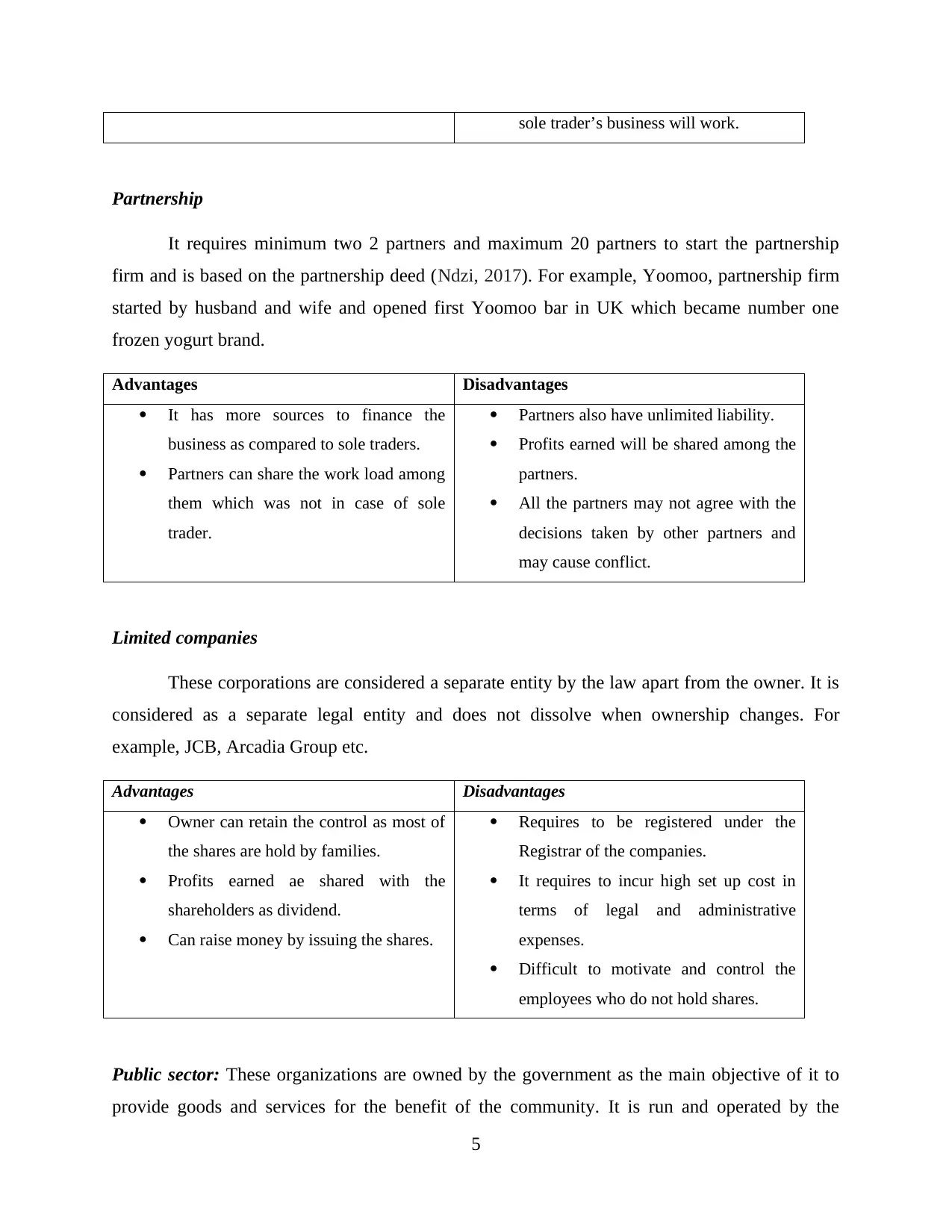
sole trader’s business will work.
Partnership
It requires minimum two 2 partners and maximum 20 partners to start the partnership
firm and is based on the partnership deed (Ndzi, 2017). For example, Yoomoo, partnership firm
started by husband and wife and opened first Yoomoo bar in UK which became number one
frozen yogurt brand.
Advantages Disadvantages
It has more sources to finance the
business as compared to sole traders.
Partners can share the work load among
them which was not in case of sole
trader.
Partners also have unlimited liability.
Profits earned will be shared among the
partners.
All the partners may not agree with the
decisions taken by other partners and
may cause conflict.
Limited companies
These corporations are considered a separate entity by the law apart from the owner. It is
considered as a separate legal entity and does not dissolve when ownership changes. For
example, JCB, Arcadia Group etc.
Advantages Disadvantages
Owner can retain the control as most of
the shares are hold by families.
Profits earned ae shared with the
shareholders as dividend.
Can raise money by issuing the shares.
Requires to be registered under the
Registrar of the companies.
It requires to incur high set up cost in
terms of legal and administrative
expenses.
Difficult to motivate and control the
employees who do not hold shares.
Public sector: These organizations are owned by the government as the main objective of it to
provide goods and services for the benefit of the community. It is run and operated by the
5
Partnership
It requires minimum two 2 partners and maximum 20 partners to start the partnership
firm and is based on the partnership deed (Ndzi, 2017). For example, Yoomoo, partnership firm
started by husband and wife and opened first Yoomoo bar in UK which became number one
frozen yogurt brand.
Advantages Disadvantages
It has more sources to finance the
business as compared to sole traders.
Partners can share the work load among
them which was not in case of sole
trader.
Partners also have unlimited liability.
Profits earned will be shared among the
partners.
All the partners may not agree with the
decisions taken by other partners and
may cause conflict.
Limited companies
These corporations are considered a separate entity by the law apart from the owner. It is
considered as a separate legal entity and does not dissolve when ownership changes. For
example, JCB, Arcadia Group etc.
Advantages Disadvantages
Owner can retain the control as most of
the shares are hold by families.
Profits earned ae shared with the
shareholders as dividend.
Can raise money by issuing the shares.
Requires to be registered under the
Registrar of the companies.
It requires to incur high set up cost in
terms of legal and administrative
expenses.
Difficult to motivate and control the
employees who do not hold shares.
Public sector: These organizations are owned by the government as the main objective of it to
provide goods and services for the benefit of the community. It is run and operated by the
5
Paraphrase This Document
Need a fresh take? Get an instant paraphrase of this document with our AI Paraphraser
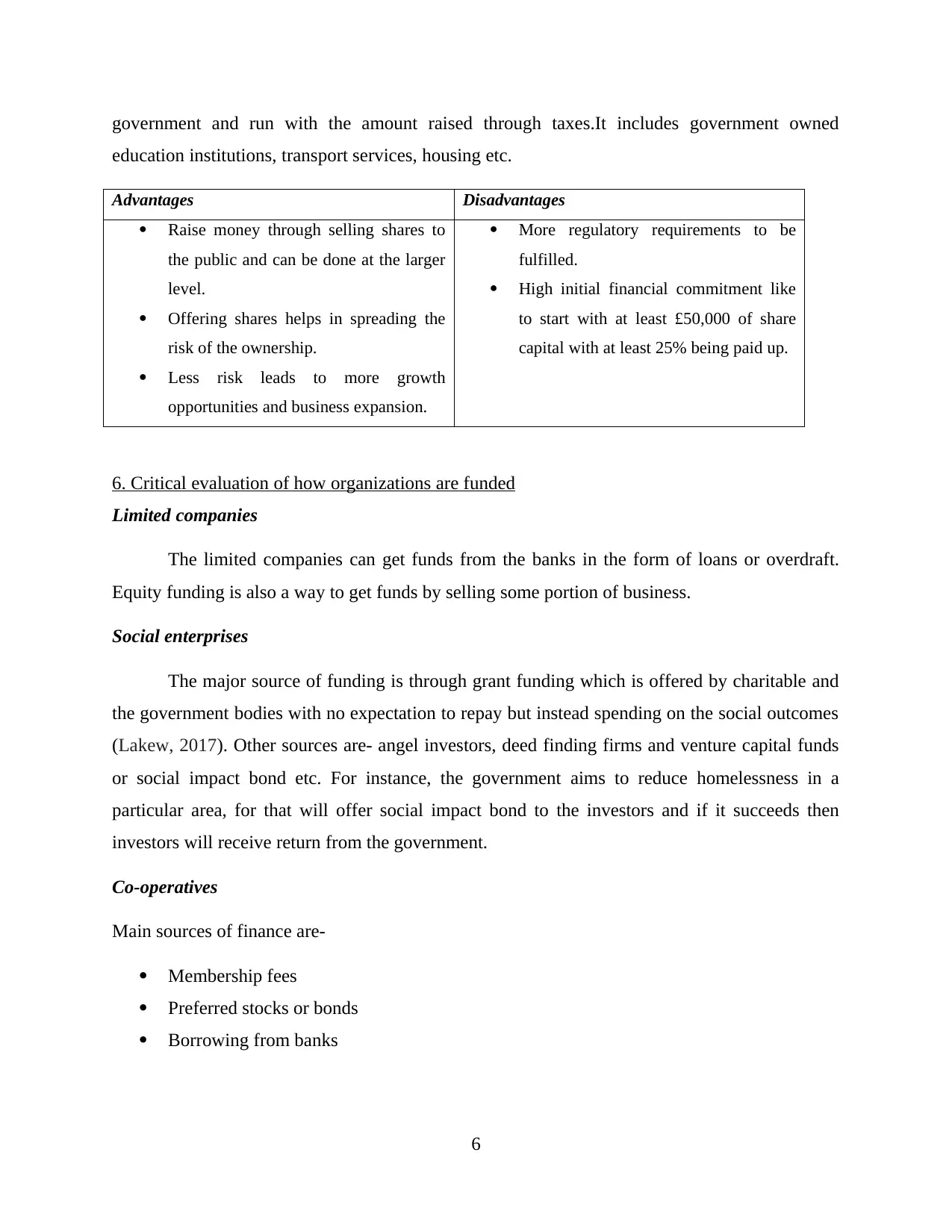
government and run with the amount raised through taxes.It includes government owned
education institutions, transport services, housing etc.
Advantages Disadvantages
Raise money through selling shares to
the public and can be done at the larger
level.
Offering shares helps in spreading the
risk of the ownership.
Less risk leads to more growth
opportunities and business expansion.
More regulatory requirements to be
fulfilled.
High initial financial commitment like
to start with at least £50,000 of share
capital with at least 25% being paid up.
6. Critical evaluation of how organizations are funded
Limited companies
The limited companies can get funds from the banks in the form of loans or overdraft.
Equity funding is also a way to get funds by selling some portion of business.
Social enterprises
The major source of funding is through grant funding which is offered by charitable and
the government bodies with no expectation to repay but instead spending on the social outcomes
(Lakew, 2017). Other sources are- angel investors, deed finding firms and venture capital funds
or social impact bond etc. For instance, the government aims to reduce homelessness in a
particular area, for that will offer social impact bond to the investors and if it succeeds then
investors will receive return from the government.
Co-operatives
Main sources of finance are-
Membership fees
Preferred stocks or bonds
Borrowing from banks
6
education institutions, transport services, housing etc.
Advantages Disadvantages
Raise money through selling shares to
the public and can be done at the larger
level.
Offering shares helps in spreading the
risk of the ownership.
Less risk leads to more growth
opportunities and business expansion.
More regulatory requirements to be
fulfilled.
High initial financial commitment like
to start with at least £50,000 of share
capital with at least 25% being paid up.
6. Critical evaluation of how organizations are funded
Limited companies
The limited companies can get funds from the banks in the form of loans or overdraft.
Equity funding is also a way to get funds by selling some portion of business.
Social enterprises
The major source of funding is through grant funding which is offered by charitable and
the government bodies with no expectation to repay but instead spending on the social outcomes
(Lakew, 2017). Other sources are- angel investors, deed finding firms and venture capital funds
or social impact bond etc. For instance, the government aims to reduce homelessness in a
particular area, for that will offer social impact bond to the investors and if it succeeds then
investors will receive return from the government.
Co-operatives
Main sources of finance are-
Membership fees
Preferred stocks or bonds
Borrowing from banks
6
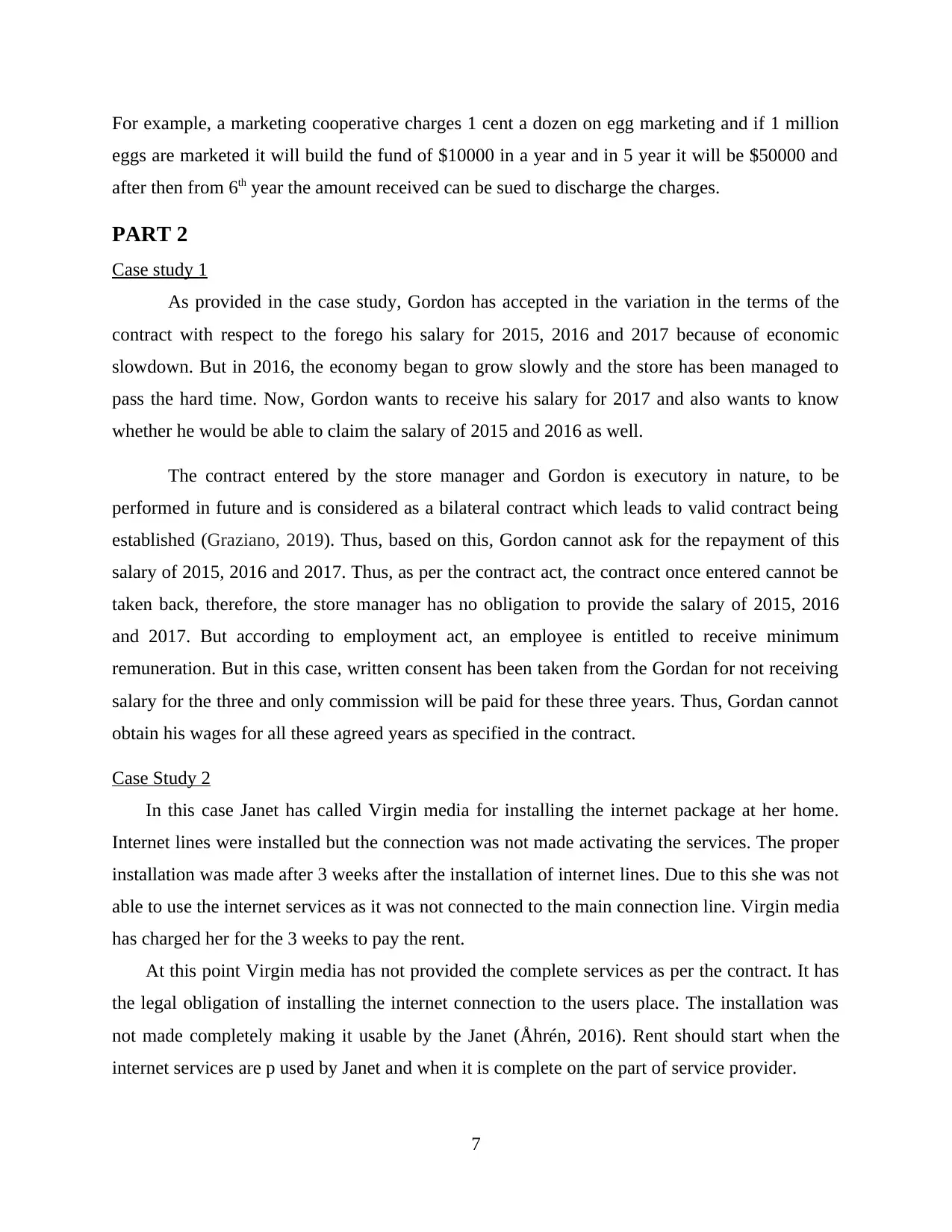
For example, a marketing cooperative charges 1 cent a dozen on egg marketing and if 1 million
eggs are marketed it will build the fund of $10000 in a year and in 5 year it will be $50000 and
after then from 6th year the amount received can be sued to discharge the charges.
PART 2
Case study 1
As provided in the case study, Gordon has accepted in the variation in the terms of the
contract with respect to the forego his salary for 2015, 2016 and 2017 because of economic
slowdown. But in 2016, the economy began to grow slowly and the store has been managed to
pass the hard time. Now, Gordon wants to receive his salary for 2017 and also wants to know
whether he would be able to claim the salary of 2015 and 2016 as well.
The contract entered by the store manager and Gordon is executory in nature, to be
performed in future and is considered as a bilateral contract which leads to valid contract being
established (Graziano, 2019). Thus, based on this, Gordon cannot ask for the repayment of this
salary of 2015, 2016 and 2017. Thus, as per the contract act, the contract once entered cannot be
taken back, therefore, the store manager has no obligation to provide the salary of 2015, 2016
and 2017. But according to employment act, an employee is entitled to receive minimum
remuneration. But in this case, written consent has been taken from the Gordan for not receiving
salary for the three and only commission will be paid for these three years. Thus, Gordan cannot
obtain his wages for all these agreed years as specified in the contract.
Case Study 2
In this case Janet has called Virgin media for installing the internet package at her home.
Internet lines were installed but the connection was not made activating the services. The proper
installation was made after 3 weeks after the installation of internet lines. Due to this she was not
able to use the internet services as it was not connected to the main connection line. Virgin media
has charged her for the 3 weeks to pay the rent.
At this point Virgin media has not provided the complete services as per the contract. It has
the legal obligation of installing the internet connection to the users place. The installation was
not made completely making it usable by the Janet (Åhrén, 2016). Rent should start when the
internet services are p used by Janet and when it is complete on the part of service provider.
7
eggs are marketed it will build the fund of $10000 in a year and in 5 year it will be $50000 and
after then from 6th year the amount received can be sued to discharge the charges.
PART 2
Case study 1
As provided in the case study, Gordon has accepted in the variation in the terms of the
contract with respect to the forego his salary for 2015, 2016 and 2017 because of economic
slowdown. But in 2016, the economy began to grow slowly and the store has been managed to
pass the hard time. Now, Gordon wants to receive his salary for 2017 and also wants to know
whether he would be able to claim the salary of 2015 and 2016 as well.
The contract entered by the store manager and Gordon is executory in nature, to be
performed in future and is considered as a bilateral contract which leads to valid contract being
established (Graziano, 2019). Thus, based on this, Gordon cannot ask for the repayment of this
salary of 2015, 2016 and 2017. Thus, as per the contract act, the contract once entered cannot be
taken back, therefore, the store manager has no obligation to provide the salary of 2015, 2016
and 2017. But according to employment act, an employee is entitled to receive minimum
remuneration. But in this case, written consent has been taken from the Gordan for not receiving
salary for the three and only commission will be paid for these three years. Thus, Gordan cannot
obtain his wages for all these agreed years as specified in the contract.
Case Study 2
In this case Janet has called Virgin media for installing the internet package at her home.
Internet lines were installed but the connection was not made activating the services. The proper
installation was made after 3 weeks after the installation of internet lines. Due to this she was not
able to use the internet services as it was not connected to the main connection line. Virgin media
has charged her for the 3 weeks to pay the rent.
At this point Virgin media has not provided the complete services as per the contract. It has
the legal obligation of installing the internet connection to the users place. The installation was
not made completely making it usable by the Janet (Åhrén, 2016). Rent should start when the
internet services are p used by Janet and when it is complete on the part of service provider.
7
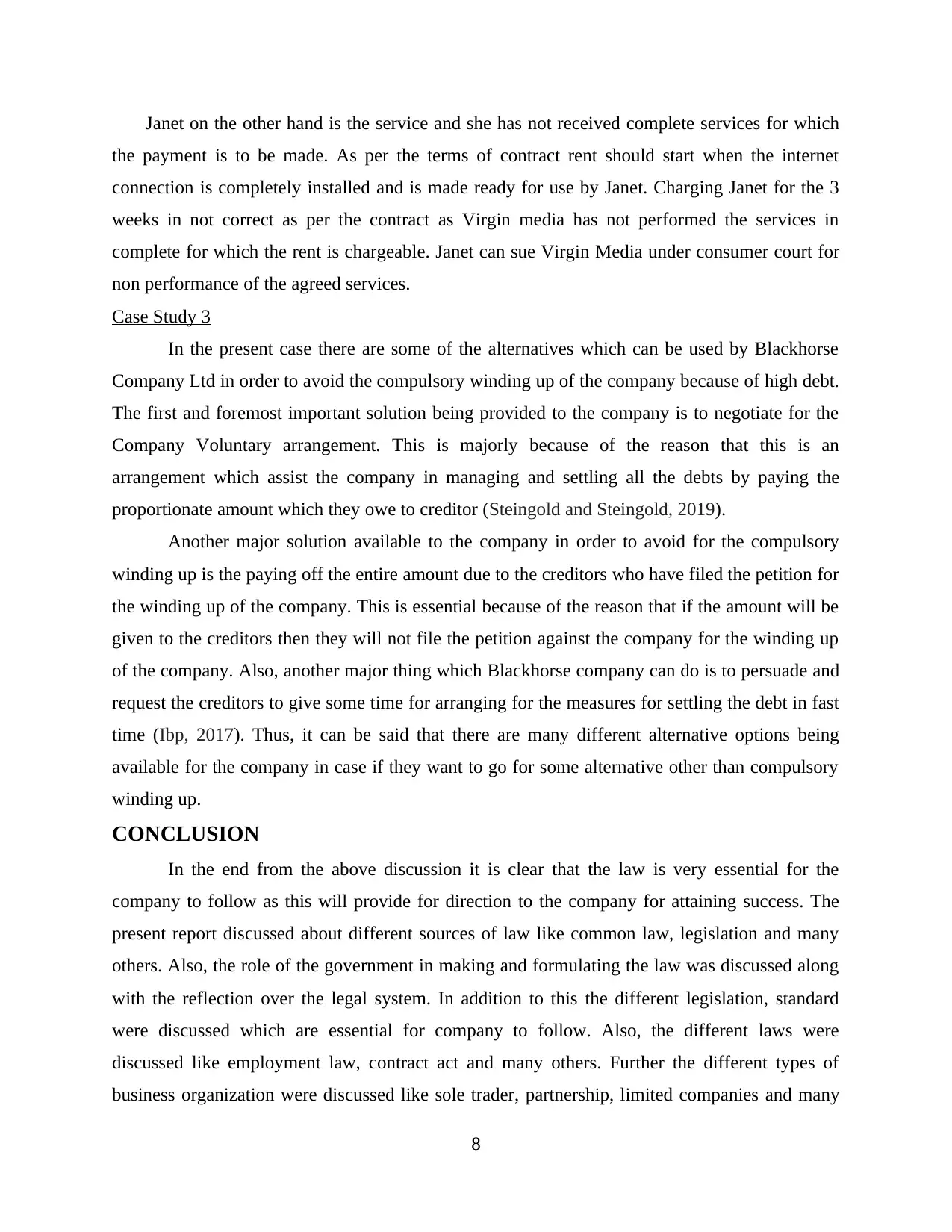
Janet on the other hand is the service and she has not received complete services for which
the payment is to be made. As per the terms of contract rent should start when the internet
connection is completely installed and is made ready for use by Janet. Charging Janet for the 3
weeks in not correct as per the contract as Virgin media has not performed the services in
complete for which the rent is chargeable. Janet can sue Virgin Media under consumer court for
non performance of the agreed services.
Case Study 3
In the present case there are some of the alternatives which can be used by Blackhorse
Company Ltd in order to avoid the compulsory winding up of the company because of high debt.
The first and foremost important solution being provided to the company is to negotiate for the
Company Voluntary arrangement. This is majorly because of the reason that this is an
arrangement which assist the company in managing and settling all the debts by paying the
proportionate amount which they owe to creditor (Steingold and Steingold, 2019).
Another major solution available to the company in order to avoid for the compulsory
winding up is the paying off the entire amount due to the creditors who have filed the petition for
the winding up of the company. This is essential because of the reason that if the amount will be
given to the creditors then they will not file the petition against the company for the winding up
of the company. Also, another major thing which Blackhorse company can do is to persuade and
request the creditors to give some time for arranging for the measures for settling the debt in fast
time (Ibp, 2017). Thus, it can be said that there are many different alternative options being
available for the company in case if they want to go for some alternative other than compulsory
winding up.
CONCLUSION
In the end from the above discussion it is clear that the law is very essential for the
company to follow as this will provide for direction to the company for attaining success. The
present report discussed about different sources of law like common law, legislation and many
others. Also, the role of the government in making and formulating the law was discussed along
with the reflection over the legal system. In addition to this the different legislation, standard
were discussed which are essential for company to follow. Also, the different laws were
discussed like employment law, contract act and many others. Further the different types of
business organization were discussed like sole trader, partnership, limited companies and many
8
the payment is to be made. As per the terms of contract rent should start when the internet
connection is completely installed and is made ready for use by Janet. Charging Janet for the 3
weeks in not correct as per the contract as Virgin media has not performed the services in
complete for which the rent is chargeable. Janet can sue Virgin Media under consumer court for
non performance of the agreed services.
Case Study 3
In the present case there are some of the alternatives which can be used by Blackhorse
Company Ltd in order to avoid the compulsory winding up of the company because of high debt.
The first and foremost important solution being provided to the company is to negotiate for the
Company Voluntary arrangement. This is majorly because of the reason that this is an
arrangement which assist the company in managing and settling all the debts by paying the
proportionate amount which they owe to creditor (Steingold and Steingold, 2019).
Another major solution available to the company in order to avoid for the compulsory
winding up is the paying off the entire amount due to the creditors who have filed the petition for
the winding up of the company. This is essential because of the reason that if the amount will be
given to the creditors then they will not file the petition against the company for the winding up
of the company. Also, another major thing which Blackhorse company can do is to persuade and
request the creditors to give some time for arranging for the measures for settling the debt in fast
time (Ibp, 2017). Thus, it can be said that there are many different alternative options being
available for the company in case if they want to go for some alternative other than compulsory
winding up.
CONCLUSION
In the end from the above discussion it is clear that the law is very essential for the
company to follow as this will provide for direction to the company for attaining success. The
present report discussed about different sources of law like common law, legislation and many
others. Also, the role of the government in making and formulating the law was discussed along
with the reflection over the legal system. In addition to this the different legislation, standard
were discussed which are essential for company to follow. Also, the different laws were
discussed like employment law, contract act and many others. Further the different types of
business organization were discussed like sole trader, partnership, limited companies and many
8
Secure Best Marks with AI Grader
Need help grading? Try our AI Grader for instant feedback on your assignments.

others. Further the funding of different organization was discussed like membership fee, bank
loans and many others. Also, the different case study was discussed relating to the different
aspect of the law and related things.
9
loans and many others. Also, the different case study was discussed relating to the different
aspect of the law and related things.
9
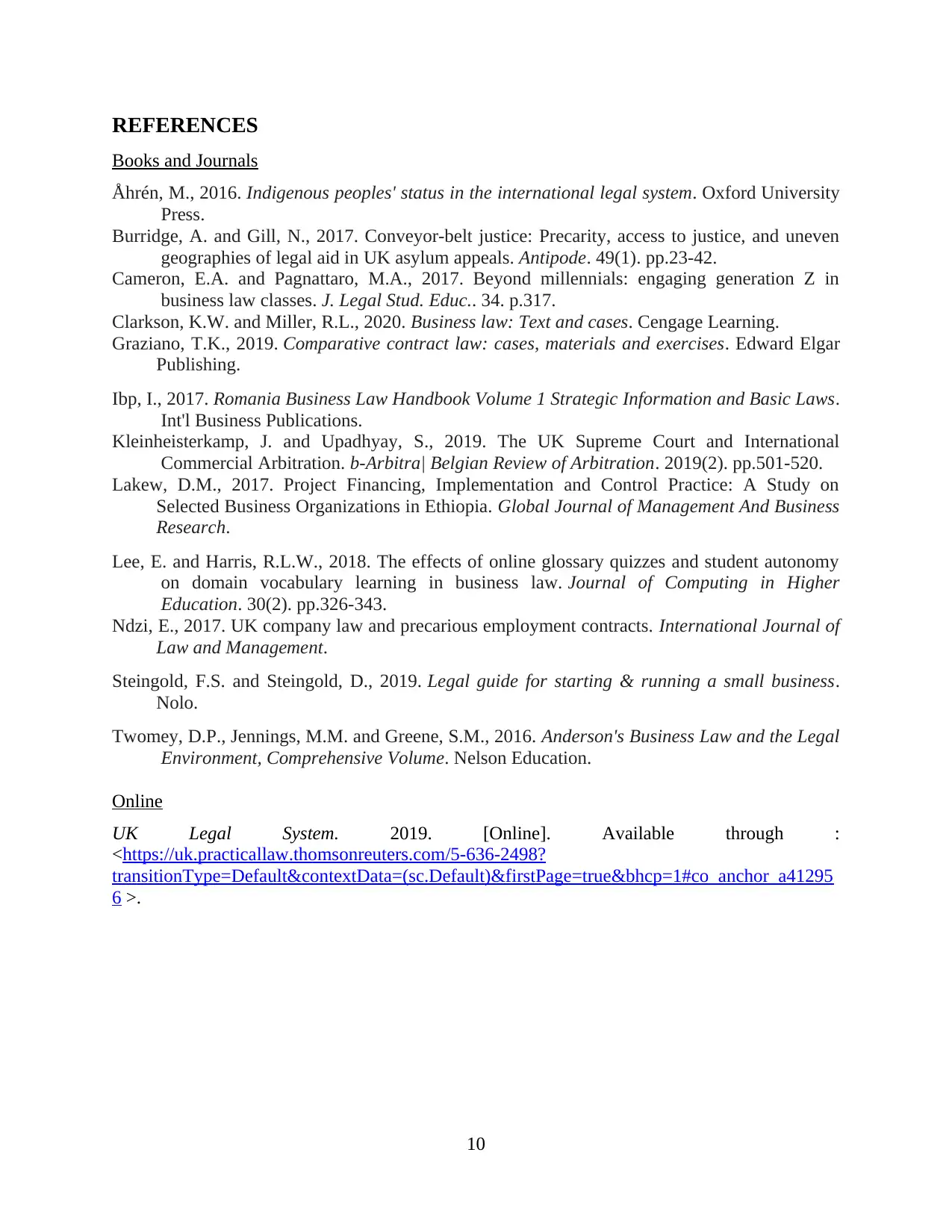
REFERENCES
Books and Journals
Åhrén, M., 2016. Indigenous peoples' status in the international legal system. Oxford University
Press.
Burridge, A. and Gill, N., 2017. Conveyor‐belt justice: Precarity, access to justice, and uneven
geographies of legal aid in UK asylum appeals. Antipode. 49(1). pp.23-42.
Cameron, E.A. and Pagnattaro, M.A., 2017. Beyond millennials: engaging generation Z in
business law classes. J. Legal Stud. Educ.. 34. p.317.
Clarkson, K.W. and Miller, R.L., 2020. Business law: Text and cases. Cengage Learning.
Graziano, T.K., 2019. Comparative contract law: cases, materials and exercises. Edward Elgar
Publishing.
Ibp, I., 2017. Romania Business Law Handbook Volume 1 Strategic Information and Basic Laws.
Int'l Business Publications.
Kleinheisterkamp, J. and Upadhyay, S., 2019. The UK Supreme Court and International
Commercial Arbitration. b-Arbitra| Belgian Review of Arbitration. 2019(2). pp.501-520.
Lakew, D.M., 2017. Project Financing, Implementation and Control Practice: A Study on
Selected Business Organizations in Ethiopia. Global Journal of Management And Business
Research.
Lee, E. and Harris, R.L.W., 2018. The effects of online glossary quizzes and student autonomy
on domain vocabulary learning in business law. Journal of Computing in Higher
Education. 30(2). pp.326-343.
Ndzi, E., 2017. UK company law and precarious employment contracts. International Journal of
Law and Management.
Steingold, F.S. and Steingold, D., 2019. Legal guide for starting & running a small business.
Nolo.
Twomey, D.P., Jennings, M.M. and Greene, S.M., 2016. Anderson's Business Law and the Legal
Environment, Comprehensive Volume. Nelson Education.
Online
UK Legal System. 2019. [Online]. Available through :
<https://uk.practicallaw.thomsonreuters.com/5-636-2498?
transitionType=Default&contextData=(sc.Default)&firstPage=true&bhcp=1#co_anchor_a41295
6 >.
10
Books and Journals
Åhrén, M., 2016. Indigenous peoples' status in the international legal system. Oxford University
Press.
Burridge, A. and Gill, N., 2017. Conveyor‐belt justice: Precarity, access to justice, and uneven
geographies of legal aid in UK asylum appeals. Antipode. 49(1). pp.23-42.
Cameron, E.A. and Pagnattaro, M.A., 2017. Beyond millennials: engaging generation Z in
business law classes. J. Legal Stud. Educ.. 34. p.317.
Clarkson, K.W. and Miller, R.L., 2020. Business law: Text and cases. Cengage Learning.
Graziano, T.K., 2019. Comparative contract law: cases, materials and exercises. Edward Elgar
Publishing.
Ibp, I., 2017. Romania Business Law Handbook Volume 1 Strategic Information and Basic Laws.
Int'l Business Publications.
Kleinheisterkamp, J. and Upadhyay, S., 2019. The UK Supreme Court and International
Commercial Arbitration. b-Arbitra| Belgian Review of Arbitration. 2019(2). pp.501-520.
Lakew, D.M., 2017. Project Financing, Implementation and Control Practice: A Study on
Selected Business Organizations in Ethiopia. Global Journal of Management And Business
Research.
Lee, E. and Harris, R.L.W., 2018. The effects of online glossary quizzes and student autonomy
on domain vocabulary learning in business law. Journal of Computing in Higher
Education. 30(2). pp.326-343.
Ndzi, E., 2017. UK company law and precarious employment contracts. International Journal of
Law and Management.
Steingold, F.S. and Steingold, D., 2019. Legal guide for starting & running a small business.
Nolo.
Twomey, D.P., Jennings, M.M. and Greene, S.M., 2016. Anderson's Business Law and the Legal
Environment, Comprehensive Volume. Nelson Education.
Online
UK Legal System. 2019. [Online]. Available through :
<https://uk.practicallaw.thomsonreuters.com/5-636-2498?
transitionType=Default&contextData=(sc.Default)&firstPage=true&bhcp=1#co_anchor_a41295
6 >.
10
1 out of 12
Related Documents
Your All-in-One AI-Powered Toolkit for Academic Success.
+13062052269
info@desklib.com
Available 24*7 on WhatsApp / Email
![[object Object]](/_next/static/media/star-bottom.7253800d.svg)
Unlock your academic potential
© 2024 | Zucol Services PVT LTD | All rights reserved.





